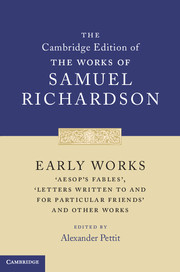Book contents
- Frontmatter
- Dedication
- Contents
- General Editors’ Preface
- Acknowledgements
- Chronology
- List of Abbreviations
- General Introduction
- Textual Introduction
- The Apprentice’s Vade Mecum (1733)
- A Seasonable Examination of the Pleas and Pretensions (1735)
- Preface to Aubin, A Collection of Entertaining Histories and Novels (1739)
- Aesop’s Fables (1739)
- Letters Written to and for Particular Friends (1741)
- Six Original Letters Upon Duelling (1765)
- Appendix: The Infidel Convicted (1731)
- Postscript
- Emendations
- Word-division
- Bibliographical Descriptions of Early Editions
- Explanatory Notes
- Index
Letter VIII
Published online by Cambridge University Press: 30 June 2022
- Frontmatter
- Dedication
- Contents
- General Editors’ Preface
- Acknowledgements
- Chronology
- List of Abbreviations
- General Introduction
- Textual Introduction
- The Apprentice’s Vade Mecum (1733)
- A Seasonable Examination of the Pleas and Pretensions (1735)
- Preface to Aubin, A Collection of Entertaining Histories and Novels (1739)
- Aesop’s Fables (1739)
- Letters Written to and for Particular Friends (1741)
- Six Original Letters Upon Duelling (1765)
- Appendix: The Infidel Convicted (1731)
- Postscript
- Emendations
- Word-division
- Bibliographical Descriptions of Early Editions
- Explanatory Notes
- Index
Summary
General Rules for Agreeable Conversation in a young Man. From a Father to a Son.
Dear William,
As I had not an Opportunity of saying so much to you as I wished when you were last here; I send this to inform you of some things in your general Conversation, which I think would be proper for you to observe, and amend; particularly your excessive Itch for Talking, which discovers itself alike on all Occasions. I have always flatter’d myself that you do not want Sense, and am willing to hope I have not been deceived: But the dangerous Self-sufficiency of most young Men, seems violently to have seized you, which, I hope, a little Reflection will remove.
The Art of rendering yourself agreeable in Conversation is worth your serious Study: ‘Tis an Advantage few can boast, tho’ sought after by all; and nothing is so constant an Enemy to Success in those who would excel in this Art, as the harbouring an Opinion of their own Proficiency, before they have attained to any tolerable Degree of Knowledge in what they imagine themselves possessed of. Conversation, where it is rightly managed, must be so conducted, as to let each Member of the Company have a Share in the Pleasure and Applause it affords: If you are Six in Number, after you have told a Story, or made any Remark which gives a general Satisfaction; you must consider it the Right of another to call your Attention in his Turn; and, unless particularly requested, it betrays a great Weakness to follow yourself. No doubt but you love to be admired: And have not others the same Passion? You believe your Wit more brilliant than theirs? Are you sure that they are not of the same Opinion as to their own? If a Man speaks little, you must not from thence conclude him willing to give up every Claim to conversible Merit: Perhaps he cannot sing: But to be sure he is as desirous of having his peculiar Humour, or his dry Joke applauded, as you are to be intreated another Song.
- Type
- Chapter
- Information
- Early Works'Aesop's Fables', 'Letters Written to and for Particular Friends' and Other Works, pp. 344 - 345Publisher: Cambridge University PressPrint publication year: 2011

